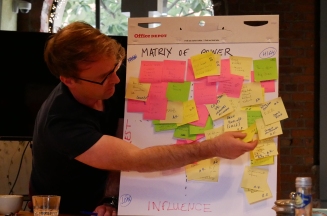Warm Homes for All
Warm Homes for All
This project developed a model for funding energy efficiency schemes which benefits vulnerable and fuel poor customers and invests in the local community.
Organisation behind the project

Based in Greater Manchester, Carbon Co-op is a not-for-profit community energy organisation which aims to help people and communities make radical reductions in household carbon emissions and energy bills. It delivers low carbon, innovation projects and promotes energy-saving retrofit services for domestic homes such as insulation, new heating systems and solar panels.
Background and detailed description of the project
Working in partnership with the local authority, the community and local suppliers, the Warm Homes for All project developed a model for funding energy efficiency schemes which benefits vulnerable and fuel poor customers and invests in the local community.
The project set out to explore what a well funded, socially just approach to energy efficiency schemes could look like, in the context of fuel poverty. It involved research and engagement with stakeholders, and has made recommendations through funding and installing energy efficiency measures in customers’ homes.
Using our £14,720 funding, the project has successfully provided support to local energy efficiency schemes and helped generate and retain investment within the local community. Engagement with the end-customers, the local authority and supply chain was key to its successful delivery.
Local authorities were already funding small-scale energy efficiency improvements, but these had little input from the communities whose homes they serve. When applying for our funding Carbon Co-op project manager Aneaka Kellay cited schemes from other sectors which demonstrate that involving the end-user is key to designing well functioning services, such as user-centred design approaches in disability services.
Aneaka stressed that to have any real impact on fuel poverty, we need quality design and build contractors and processes which will deliver high-performing energy efficiency projects. To achieve this, local authorities need to develop the capacity and expertise necessary to ensure effective schemes, developed and delivered by local suppliers with meaningful involvement of the local community.
One of the first tasks for the project was to talk to key stakeholders, build relationships with local suppliers and research alternative supply chain models adopted by other organisations, which might be suitable for the provision of energy efficiency services.
One such alternative was a procurement approach adopted by Preston City Council which follows community wealth-building principles, investing in local supply chains and facilitating community participation. The ‘Preston model’ ensures investment is re-circulated locally and supports the creation of local skills and apprenticeships.
Desk-based research was shared and explored with stakeholders via workshops involving contractors, local authority officers, community organisations, vulnerable customers and stakeholders such as Electricity North West. These focused on learning from previous schemes and explored alternative approaches to resident engagement, funding, procurement and managing risk. Approaches such as community wealth-building and user-led design were also explored. The workshops provided opportunities for information-sharing, building relationships and generating ideas.
Recommendations which emerged from research and stakeholder engagement were fed into Carbon Co-op's area-based scheme which installs measures in the homes of vulnerable customers. The project has successfully demonstrated how community energy organisations around the North West can collaborate with local institutions to deliver energy efficiency schemes for vulnerable customers that are effective and just. The project’s output will be monitored for several years to provide evidence of its effectiveness.
Project partners
To deliver the Warm Homes for All project, Carbon Co-op worked with a number of partners including:
- URBED (Urbanism, Environment and Design) – an award-winning design and research consultancy based in Manchester
- Sustainable Housing & Urban Studies Unit – a multi-disciplinary research group at the University of Salford.
Where to go for further information
For more information on our community and local energy strategy visit our strategy page or to find out more about the work of the Carbon Co-op visit their website.